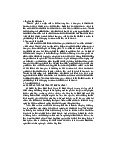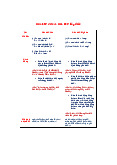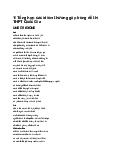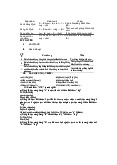

Preview text:
People are divided in opinion regarding paying education taxes to government for some
parents who take their children to private schools instead of state ones. In my opinion, I
completely agree with this point of view.
To begin with, it is the fact that private academy have expensive costs for their learning
while not only are students in state education free for going to school but also taken
scholarship from government. It means families need to pay both expensive tuition and taxes ?
if required which leads to financial burden for them. Furthermore, if they are required to take
their offsprings to individual school on account of lacking of government schools, there are
many difficulties for them to pay unless they are wealthy.
Another reason for supporting this statement is that people want their childen recieve
quality of academy, infrastructure proportional to how much they have paid. In other words, a rồồi ủ
they believe government use their money unreasonably to construct, develop education liên
system and facilites. For instance, there are not laboratories, musical instrument or culture quan gì
lesson in state school while private academ supple them these with better status. It is reason v i cái ớ
why they decide to pay more money for better quality, if government pay attention on đêồ????
developing better school and education system, they will send their children to there and pay taxes without any doubt.
To conclude, it’s my strong believe that parents who send their children to private
institution should not be required to pay taxes for supporting public school in terms of
fanancial burden and standard of government school.
People are divided in the opinion regarding whether paying education taxes should be
obligatory for parents who take their children to private schools. In my opinion, while I
believe that this obligation looks rather inapplicable, I also side with those who hold the view
that every person is required to contribute part of their income to the state budget for education.
On the one hand, the primary reason behind the general agreement that the tax collected
from parents sending their children to private educational institutions ought to be eliminated
is strongly related to financial matter. In other words, they have spent a considerable amount
of money on services at such places, beyond compared to those in ordinary public schools,
such as air conditioning and regular field trips; therefore, it would seem less sensible when
they are demanded to pay extra education taxes to support the schools that have no relation with them.
On the other hand, it is individual’s duty to pay taxes to the government irrespective of
what school people let their children attend. The idea that collecting education taxes from
society, notwithstanding any walks of life except for several special cases including the
disabled and the incapable of work aims at collective equality, which, all together, makes any
acts of evasion unacceptable. Beside covering the expenses of the national strategies in
numerous fields, these tax revenues are usually directed back to the investment in education,
including two main aspects, one of which is to refurbish and upgrade the outdated equipment
in any institutions while the other, considered far more essential, is to bring fundamental
education to the remote, depressed regions in the effort to erase illiteracy. For that reason,
families having their children studied at either public or private schools should pay such taxes
not only as it is everyone’s responsibility towards their home country but also because it
offers learning opportunities to those living in secluded areas.
To conclude, while I am in agreement that the compulsion of paying extra education taxes
needs careful consideration for those who have their children learning at private schools, I
firmly believe that everybody should be charged of such money to support the state in general
and their educational system in particular.




